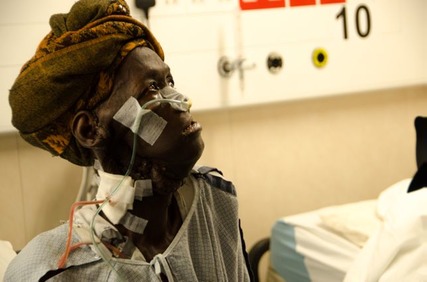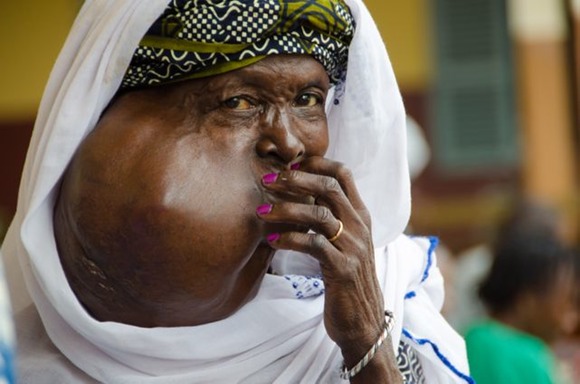Sory, a frightened, cowering seventeen-year-old boy with a large
benign facial tumor, waited for what no one had ever thought was
possible . . . a surgery that would remove the growth. Sory shrouded
himself completely, leaving only a small gap for one eye to continually
survey his surroundings.
His mother, Saran, sat close to him, holding his left hand firmly to
her knee. Her gesture – so quiet, yet so enormously significant in a
superstitious culture – indicated clearly that she would never stop
loving him. As Sory’s tumor had grown and ballooned its way out of his
mouth, his mother had drawn closer to her son. If he was to live a
nightmare, then she would live that nightmare too. That is what a mother
does for her children.
Before Sory’s tumor started growing from his cheekbone, he and his
farming family lived a happy, simple life. Sory’s father and older
brother gave him the oxen to care for and work with when he was nine
years old. Sory had a special gift with the oxen, naming them Keoulan
and Lonni. He expertly guided them through their many farm chores.
Sory’s mother also worked the farm field, keeping a proud eye on her
younger son as he coaxed steady effort out of Keoulan and Lonni. Saran
liked to watch Sory play football, thinking to herself what a fine young
man he was becoming.
When Sory complained about the lump that was growing, Saran was
immediately worried. “Sory was always such a happy and healthy boy. I
knew that something must be very wrong for him to say something.” Over
the next two years, Sory experienced regular dizzy spells, but no pain,
as the tumor continued to push its way forward. He could no longer hide
the now gaping distortion in his face. Saran’s eyes fill with deep
sorrow as she recounts how her son’s once promising life crumbled. “I
learned quickly how cruel people can be. No one in our small village
ever had a condition like this before, so they believed that Sory was
cursed. People were so frightened of Sory that they would yell and throw
sticks at him. Saran and her husband Balla made a painful decision to
keep Sory hidden at home or on the farm field. Saran recalls how her
heart shattered as she saw the deep confusion and agony in her son’s
eyes. “The more he was consumed by pain and fear, the more love I needed
to pour into him,” she explained.
While Saran prayed continually for her son, she started to feel her
own crushing despair. Sory’s struggles with eating and his difficulty
breathing were all signs that more growth in his tumor would surely
bring an end to his life. Saran never let Sory see her sorrow or fear.
Instead, as Sory recalls, “My mother gave me hope. I cried so many times
because I could not attend celebrations or play outside, and she would
always comfort me. We would pray together, and she would tell me over
and over how there would be healing for me.”
Sory believes his mother’s steadfast love, support and encouragement
bought him the precious time he needed until the healing they prayed for
arrived. Saran recalls that day with great emotion. “The tumor had
taken over Sory’s entire life. He could only swallow a little meat
broth, and he was desperately weak. He lost all consciousness of the
world around him. Then, when I felt he was close to his last breath, my
husband’s brother, Moussa, called us. He said, ‘Balla, bring Sory to
Conakry right away. There is a ship here that does operations.’ Within
two weeks Sory was admitted into the Mercy Ships hospital.”
During the hours that Sory was in surgery, Saran found herself seized
by a flood of memories. She explains, “I recalled every moment of pain
Sory had suffered – especially the rejection, the insults and the
whispers that it would be better if he died. And now, my boy was being
healed. God heard our prayers, and He gave Sory his life back.”
According to Sory, God heard the infinite faithfulness of his mother.
“God knows my mother never gave up on me. God knows that when no one
else could love me, she loved me. God knows that when no one else would
eat with me, she ate with me. God knows that my mother would have given
her own life for me to be healed. God knows it, and I know it too.”
Following two months of recovery, there are only a few reminders of
the voracious tumor that threatened to consume Sory’s young life. The
smile he shares with his mother reveals some missing upper teeth. While
his nose is a bit askew, every day his facial features take on more of
their original contours. Sory’s most important thoughts these days
center on returning to the farm and the future he wants to fill with
friends, a wife and some grandchildren for his mother.
Before making their way home to Northern Guinea, a very special
moment occurred between Sory and his mother. A few days earlier Sory
confided to a Mercy Ships volunteer that if he could give his mother
anything in the world it would be a dress as beautiful as she was.
Jillian, the volunteer, found a lovely dress at the Guinean Women’s
Co-operative for Sory to give to his mother. Sory’s eyes danced with
delight as he gently put the dress in his mother’s lap. Saran gazed up
at her son’s face – the face she had never stopped loving – and her
heart was once again whole. She hugged Sory, murmuring softly, “Thank
you, God, for the miracle of my son’s continuing life and love.”
Sory, a frightened, cowering seventeen-year-old boy with a large
benign facial tumor, waited for the near impossible in West Africa . . .
a life-changing surgery. Sory shrouded himself completely, leaving only
a small gap for one eye to continually survey his surroundings.
Sory’s mother, Saran, stays constantly at her son’s side. As Sory’s
tumor grew and ballooned its way out of his mouth, his mother drew
closer to her son. If he was to live a nightmare, then she would live
that nightmare too. That is what a mother does for her children.
Saran keeps a watchful eye on her son Sory who has just returned to
the hospital ward following successful surgery to remove his large
benign tumor. Saran had prayed continually for her son. She believes
that, “God heard our prayers, and He gave Sory his life back.”
During the years that Sory suffered with a massive benign facial
tumor his mother drew him very close to her. According to Sory, “God
knows my mother never gave up on me. God knows that when no one else
could love me, she loved me. God knows that when no one else would eat
with me, she ate with me. God knows that my mother would have given her
own life for me to be healed. God knows it, and I know it too.”
Mother and son share a happy moment – just one of the many they can
now look forward to. Sory is eager to return home to farming and hopes
to one day give his mother lots of grandchildren to love her as much as
he does.
Sory, now recovering from surgery to remove his massive tumor, has a
new focus in his life. His most important thoughts are about returning
to the farm and the future he wants to fill with friends, a wife and
some grandchildren for his mother.
Sory, his mother, and Jillian (a volunteer crew member with Mercy
Ships) have a special bond. Sory had confided to Jillian that if he
could give his mother anything in the world it would be a dress as
beautiful as she was. Jillian found a lovely dress at the Guinean
Women’s Co-operative for Sory to give to his mother. When Saran received
the dress from her son, she murmured softly, “Thank you God for the
miracle of my son’s continuing life and love.”
Written by Joanne Thibault
Edited by Nancy Predaina









































